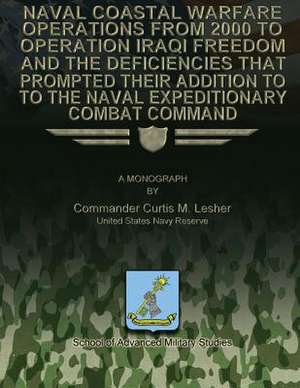Naval Coastal Warfare Operations from 2000 to Operation Iraqi Freedom and the Deficiencies That Prompted Their Addition to the Naval Expeditionary Com
Autor Us Navy Reserve Commander Curti Lesher Contribuţii de School Of Advanced Military Studiesen Limba Engleză Paperback
Preț: 113.48 lei
Nou
Puncte Express: 170
Preț estimativ în valută:
21.72€ • 23.60$ • 18.26£
21.72€ • 23.60$ • 18.26£
Carte disponibilă
Livrare economică 31 martie-14 aprilie
Preluare comenzi: 021 569.72.76
Specificații
ISBN-13: 9781479330119
ISBN-10: 1479330116
Pagini: 54
Dimensiuni: 216 x 279 x 3 mm
Greutate: 0.15 kg
Editura: CreateSpace Independent Publishing Platform
ISBN-10: 1479330116
Pagini: 54
Dimensiuni: 216 x 279 x 3 mm
Greutate: 0.15 kg
Editura: CreateSpace Independent Publishing Platform
